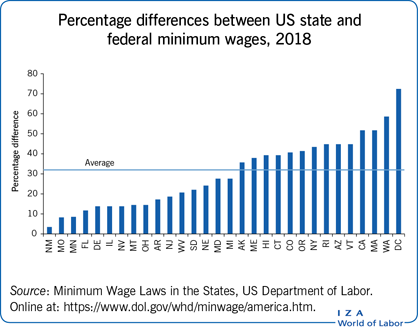Elevator pitch
The potential benefits of higher minimum wages come from the higher wages for affected workers, some of whom are in poor or low-income families. The potential downside is that a higher minimum wage may discourage firms from employing the low-wage, low-skill workers that minimum wages are intended to help. If minimum wages reduce employment of low-skill workers, then minimum wages are not a “free lunch” with which to help poor and low-income families, but instead pose a trade-off of benefits for some versus costs for others. Research findings are not unanimous, but especially for the US, evidence suggests that minimum wages reduce the jobs available to low-skill workers.

Key findings
Pros
Minimum wages may help policymakers address public demands to combat rising inequality.
Minimum wages deliver earnings gains for some workers.
Some of the workers who gain from minimum wages are in poor or low-income families.
Some studies do not find that minimum wages lead to fewer jobs.
Cons
Increasing amounts of evidence from the US indicate that higher minimum wage levels lead to fewer jobs.
Studies that focus on the least-skilled workers find the strongest evidence that minimum wages reduce jobs.
Targeted tax credits do a better job of reaching the poor than minimum wages do.
Low-paying jobs requiring low skills are the jobs most likely to decline with increased minimum wages.
In the US, most evidence does not indicate that minimum wages help poor or low-income families, or reduce most forms of public assistance.